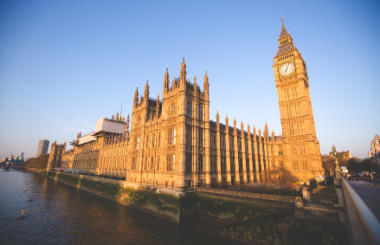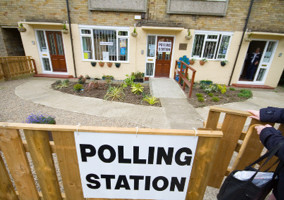The next UK general election is set to take place on Thursday 12 December. Ahead of the election, charities and sector bodies have put forward their election manifestos.
NCVO: ‘We want the future health of charities and volunteering to be a mainstream concern’
The NCVO manifesto “calls for greater political and financial investment and greater recognition of charities’ role in shaping our country’s future. We want to see a rethink of how volunteering, the voluntary sector and its connection to wider society are seen. In particular, we want the future health of charities and volunteering to be a mainstream concern.”
NCVO says its “specific asks are not new”, but that it has six key asks. These include:
- An economy that is fair for everyone: establishing a community wealth fund using money from dormant assets; a UK shared prosperity fund which delivers a comparable level of investment in disadvantaged communities that European funding currently provides; increasing local government funding; and creating a resilient communities fund in the event of a no-deal Brexit or a failure to secure a long-term trade agreement with the EU.
- A greater role in a more open democracy: providing new spaces and opportunities for local activism and participation in the community; involving charities more in policymaking; and reforming the Lobbying Act by implementing the recommendations made by Lord Hodgson’s review.
- An inclusive and open society, with strong rights and protections for everyone: including providing absolute clarity to EU citizens in the UK that their rights will be protected.
- A renewed relationship with government: the government rebooting its relationship with charities, based on a mutual commitment to building trust and recognising the independence and voice of charities regardless of any funding relationship.
- Volunteering strengthened and valued: introducing a statutory duty to allow employees of organisations over a certain size to take a limited amount of time off work to volunteer.
- Public services fit for today and tomorrow: including committing to taking decisions in the interest of future generations.
ACEVO: ‘For too long politicians on all sides have been preoccupied with the short-term’
ACEVO’s manifesto calls on politicians to “imagine better”. It proposes “a shared vision” between politicians and civil society “to create long-term change for a better future”.
Vicky Browning, ACEVO chief executive, said: “Political leadership must go beyond the election cycle, and with this manifesto we want to encourage all candidates to join us in imagining better and to recognise the need for radical change. Although the manifesto proposes ambitious goals, we want our country’s leaders to believe they are achievable, especially if MPs are willing to share power and work as a collective.”
Its key goals for the future include:
- Everyone having the freedom to love, worship and live in safety whoever they are, and wherever they come from.
- Everyone receiving a wage which enables them to provide for themselves and their family, and live in a safe home.
- No-one is homeless.
- Communities have control over decisions that impact them.
- The world is not at risk due to the climate crisis, and work is undertaken to undo the damage that has already been done to the environment.
- Everyone is able to access the health and care services they need to ensure their mental and physical wellbeing.
- The justice system protects people harmed, or at risk of harm, and rehabilitates people who commit crimes.
It said: “These are ambitious goals but those who run our country must believe they are achievable. Civil society wants to work in partnership with government to make them a reality.”
Bond: ‘We risk seeing more aid diverted away from people in desperate need’
The manifesto calls on the next government to commit to making the UK a global leader in international development.
Claire Godfrey, Bond’s interim director of policy, advocacy and research said: “This general election is very much about the kind of Britain we want post-Brexit, so it is good to see that leaders from across the political spectrum understand the value and importance of the UK’s leading role in international development. We have a global reputation we should be proud of, and this is a reputation that we are now asking party leaders to champion.
“Despite UK aid pledging to first and foremost help people facing poverty, and to promote sustainable development, we are increasingly seeing aid being used to serve short-term domestic interests. If this continues, we risk seeing more aid diverted away from people in desperate need, and the UK’s global influence on humanitarian efforts and development diminish.”
She added: “We are calling on all political parties to rise to the ambition of the global commitments the UK has signed up to on poverty eradication, reducing inequality, and tackling the climate and environment emergency as we enter the ‘decade of delivery’ to achieve the Sustainable Development Goals by 2030.”
The key priorities in Bond’s manifesto include:
- Strengthening the UK’s voice and influence on international development by targeting poverty and inequality.
- Working to make global economic, financial and other rules work for the public interest in all countries.
- Tackling the climate and environmental degradation crisis with a coherent, consistent, cross-government approach.
- Be at the forefront of promoting peacebuilding and humanitarian principles in response to conflict and global crises.
- Strengthening democratic and public accountability at all levels of international development.
Christian Aid: ‘The UK has a moral obligation to help end global poverty’
Christian Aid has said the UK has a “moral obligation” to help end global poverty. Its 2019 manifesto calls on politicians to tackle climate and economic injustice and to build peace.
The charity asks government to “take urgent action to address the climate crisis in a way which improves the lives for the poorest, backed by investment and international leadership.” It has said this would include ending all support for fossil fuel extraction; regulating and encouraging UK banks and investors to divest from fossil fuel investment.
It also calls on future government to tackle “the unfair distribution of wealth in the world” and to “tackle violence and build peace.”
It asks that power is shifted from institutions such as the IMF, the OECD and World Bank, and towards “the more equal” United Nations. It demands government immediately suspend arms sales to Saudi Arabia and the United Arab Emirates.
Daisy-Rose Srblin, Christian Aid’s senior UK advocacy adviser, said: “At a time of considerable change and turmoil, it is critical we ask those in power to play a positive global role, and create a just and sustainable world.
“We know that poverty is inherently political, and structural power imbalances continue to rob people of dignity and voice”.
Catholic Agency for Oversees Development (CAFOD): ‘We have to bring the voices of our poorest sisters and brothers to people in power’
CAFOD said the election campaign is “likely to be dominated by Brexit”, but that it “also gives Catholic voters the chance to ensure candidates standing for Parliament address the issues affecting the world’s poorest communities”.
Daniel Hale, head of campaigns at CAFOD, said: “The idea of having to go to the polling station on the way back from our Christmas shopping isn’t something that will fill many of us with festive joy.
“But an election is one of the most valuable opportunities we have to bring the voices of our poorest sisters and brothers to people in power – making sure that they are not an ‘afterthought’, as Pope Francis has warned.
“Brexit is bound to dominate this election, but we need to make sure that the candidates asking for our votes are reminded that politics has to also focus on the other critical issues we face in our common home.”
Alongside the Catholic Social Action Network (CSAN), it has produced a list of actions people can take to show candidates that voters want them to act and help to fight poverty.
It said “there are four especially important election issues to raise with candidates and parties during this campaign”.
These include asking what future government will do to tackle global poverty and to support overseas aid. Secondly, it emphasises the issue of the climate crisis, and also questions issues around trade, refugees and migrants; specifically what they wish Britain’s role in the world to be – especially when negotiating new trade deals if the UK leaves the European Union and how they will make sure refugees and migrants are treated with dignity.
Lastly, it highlights the issue of domestic poverty, and how future government will help people trapped in poverty.
|
Related articles












